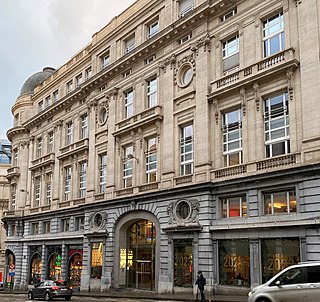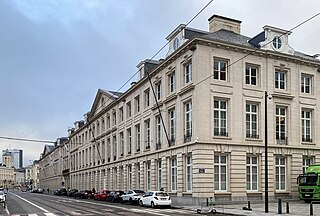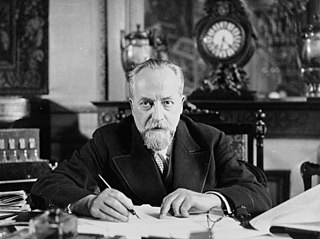
François Joseph Charles Simiand was a French sociologist and economist best known as a participant in the Année Sociologique. As a member of the French Historical School of economics, Simiand predicated a rigorous factual and statistical basis for theoretical models and policies. His contribution to French social science was recognized in 1931 when, at the age of 58, he was elected to the faculty of the Collège de France and accepted the chair in labor history.

Villers Abbey is a former Cistercian abbey located in the town of Villers-la-Ville, Walloon Brabant, Belgium. Founded in 1146, the abbey was abandoned in 1796. Most of the site has since fallen into ruins. These ruins now belong to the Walloon Region and are classified as part of Wallonia's Major Heritage.

The Banque Belge pour l'Étranger was a Belgian bank that channeled many international banking operations of its controlling shareholder the Société Générale de Belgique (SGB) in the first half of the 20th century. It was originally established by the SGB in 1902 in Brussels as the Banque Sino-Belge, at the request of King Leopold II of Belgium.

Victor de Riqueti, Marquis de Mirabeau was a French economist of the Physiocratic school. He was the father of Honoré, Comte de Mirabeau and André Boniface Louis Riqueti de Mirabeau. He was, in distinction, often referred to as the elder Mirabeau as he had a younger brother, Jean-Antoine Riqueti de Mirabeau (1717–1794).

The Borinage is an area in the Walloon province of Hainaut in Belgium. The name derives from the coal mines of the region, bores, meaning mineshafts. In French, the inhabitants of the Borinage are called Borains.

The Société Générale de Belgique was an investment bank and, subsequently, an industrial and financial conglomerate in Belgium between 1822 and 2003. It has been described as the world's first universal bank. The banking element was split in 1935 and became the Générale de Banque. At its height in the late 19th and early 20th centuries, the Société Générale exercised significant control over large portions of the national economy of Belgium and the Belgian colonial empire.
Henri Storck was a Belgian writer, filmmaker and documentarist.

André Siegfried was a French academic, geographer and political writer best known to English speakers for his commentaries on American, Canadian, and British politics.
The history of Wallonia, from prehistoric times to the present day, is that of a territory which, since 1970, has approximately coincided with the territory of Wallonia, a federated component of Belgium, which also includes the smaller German-speaking Community of Belgium. Wallonia is the name colloquially given to the Walloon Region. The French word Wallonie comes from the term Wallon, itself coming from Walh. Walh is a very old Germanic word used to refer to a speaker of Celtic or Latin.

The National Police is the national civilian police force of Niger. The National Police are under the Ministry of Interior, Public Safety and Decentralization and report to the General Directorate of National Police. They are responsible for law enforcement in urban areas, the protection of government buildings and institutions, and the security of government leaders. Niger's gendarmerie, the Gendarmerie Nationale, is a separate agency under the Niger Armed Forces, and are responsible for policing in rural areas.

The general strike of 1960–1961, known popularly in Wallonia as the Strike of the Century, was a major series of strikes in Belgium which began on 14 December 1960 and lasted approximately six weeks.

The general strike of 1893 was a major general strike in Belgium in April 1893 called by the Belgian Labour Party (POB–BWP) to pressure the government of Auguste Beernaert to introduce universal male suffrage in elections. The general strike was the first called in Belgium and a decisive moment for the nascent socialist movement in Belgium. According to the historian Carl J. Strikwerda, it was the first true general strike in the history of Europe.

Since 1893, there have been a number of general strikes in Belgium. Occasioned by the emergence of the labour movement and socialism in Belgium, general strikes have been an enduring part of Belgian political life. Originally intended to encourage the reform of the franchise, more recent strikes have focused on issues of wages and opposition to government austerity. Since 1945, general strikes have been co-ordinated by the General Federation of Belgian Labour (ABVV-FGTB), a federation of Socialist trade unions, while most before World War II were organised by the parliamentary Belgian Labour Party (POB-BWP).

The Strike of the 100,000 was an 8-day strike in German-occupied Belgium that took place from 10 to 18 May 1941. It was led by Julien Lahaut, head of the Belgian Communist Party even though the Molotov–Ribbentrop Pact was still in force. The object of the strike was to demand a wage increase, but it was also an act of passive resistance to the German occupation.

Julien Auguste John Eugène Durand was a French lawyer and Radical politician. He was briefly Minister of PTT in 1930, and was Minister of Commerce and Industry in 1932–33. He authored the first proposal for what became the 1937 International Exposition of Art and Technology in Modern Life.

The Dépôt Joseph Cuvelier of the Belgian State Archives opened in 2011. It is located on the Rue du Houblon in Brussels in a building designed by Fernand Bodson and built in 1912. Its name honors Belgian historian and government archivist Joseph Cuvelier (1869–1947).
The Malines Congresses were a series of Catholic Congresses held in Mechelen, Belgium, with the purpose of bringing together Catholics with leading roles in all walks of life, on the model of the German Katholikentage. The first three, held in 1863, 1864 and 1867, had considerable cultural, social and political impact. They lay at the foundation of the future development of a Catholic Party in Belgian politics, as well as a nascent Social Catholicism. The first congress saw the establishment of the Guild of Saint Thomas and Saint Luke, which shaped Belgian Gothic Revival architecture and art education. The main organiser of the first three congresses was Édouard Ducpétiaux, who died in 1868. They were hosted in Mechelen by the archbishop, Engelbert Sterckx, who died in December 1867, although much of the practical management fell to Isidore-Joseph du Rousseaux, a teacher at the junior seminary where many of the sessions were held.
The Union of Mineworkers of Belgium was a trade union representing coal miners in Belgium.
Events of the year 1932 in Belgium.
In Belgium, a general strike took place in June and July 1936. It was the first wave of strikes since the 1932 general strike which had occurred during the Great Depression. It broke out as part of a wildcat strike among dockworkers in the Port of Antwerp on 2 June 1936 and quickly spread to other industrial regions without the endorsement of the country's major trades unions. It was characterised by the new tactic of workplace occupations and took place against the backdrop of the creation of France's Popular Front in May 1936 and the Matignon Agreements which had followed a general strike in France from May to June 1936. It also occurred against the backdrop of the Spanish Civil War which proved divisive in Belgium. Nonetheless, the Belgian strike was unusual in uniting socialist and Catholic trade union federations in support.












